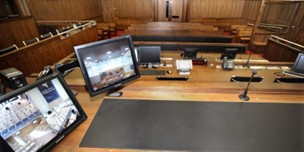WRC Hearing Arrangements Guidelines
Updated - 16 September 2024
How do WRC hearings take place?
WRC adjudication hearings may take place by way of an in-person hearing at a designated WRC location, or by remote means using the WebEx online platform.
A ‘remote hearing’ is where the participants are not all in one place and includes a hybrid hearing. A ‘hybrid hearing’ is where one or more participants attends an in-person hearing by remote means; other parties may physically attend the hearing.
All WRC hearings are conducted in a manner which is consistent with the dignified and orderly administration of justice.

In-person Hearing Image

Remote Hearing Image
Introduction
By law the WRC can decide whether an adjudication hearing will be held in-person or by remote means.1 WRC hearing arrangements are subject to the requirement that the arrangements are fair to the parties and not contrary to the interests of justice.
The WRC schedules over 6,000 hearings per annum and the majority of these hearings are held to the satisfaction of all parties. Whilst the majority of hearings are held in-person, the WRC may decide to schedule all or part of a case for a remote hearing. A remote hearing may be scheduled for a variety of reasons, including but not limited to:-
- the location of the parties;
- to enable a party’s attendance and/or participation in the hearing;
- vulnerability of hearing participants, including where there are allegations of abuse or human trafficking;
- WRC resources.
These guidelines set out the procedure a party should follow in the event of an objection to the hearing arrangements notified to the parties. Please note that this procedure should only be used for objections in relation to how the hearing will be held, i.e. in-person or remote.
The procedure outlined below does not apply to requests for postponement of scheduled hearing dates, for which there is a separate procedure – please see here:WRC Postponement Policy.
Please note that WRC has very limited resources which it must use effectively so parties are asked to work with the WRC to ensure the efficient use of hearing time, and not make applications to change the hearing arrangements unless strictly necessary.
Overview of Objections Procedure
Objections regarding an in-person or remote hearing must be received by the WRC within 10 working days starting from the date of the hearing notification letter (which may be communicated via email).
If the objection is made later than 10 working days after the date of the hearing notification letter, it will be dealt with by the Adjudication Officer (“AO”) on the day of the scheduled hearing.
Objections may be submitted to Adjudication Services via the dedicated email: objections@workplacerelations.ie. Applicants are required to state their reasons for objecting to the hearing method notified by the WRC and to provide supporting evidence.
Applicants should always copy in the other party so that they are on notice of the objection. Where the other party consents to the objection, evidence of their consent should be included.
Decisions on an objection may be made by the WRC with due regard to the interests of justice and fair procedures and with reference to the following non-exhaustive list of factors:
a) The personal circumstances of either party or any participant, including any disability or any specific accommodations that they may be required to attend and/or effectively participate in the hearing (including the use of sign or spoken language interpreters).
b) The nature and complexity of the case including whether the parties are represented; the number of witnesses required to give evidence and whether the nature of any disputed evidence is such that fairness and justice require it to be evaluated by the AO in a face-to-face environment or remotely.
c) The ability of either party to engage in the hearing in a meaningful manner which would include considerations such as access to a reliable internet connection and the requisite IT facilities (note that the WRC may require appropriate evidence confirming the status of parties’ IT facilities).
d) The impact on resources and length of the delay that will likely result if the hearing of the complaint is to be held in-person rather than remotely or vice versa.
e) Any specific circumstances in a case, including any which might present a material risk of unfairness or injustice.
Subsequent to receipt of such an application:
- The WRC will write to the other party notifying them of the objection application and the reasons furnished. Submitted supporting documentation will generally be shared with the other party.
- That party will be given 2 working days to furnish comments on the application by email.
- The Adjudication Services will refer the objection to an AO who will decide whether the objection should be upheld or refused.
- In the event that the objection is upheld by the AO, all parties will subsequently be notified of the outcome in writing and informed that the hearing will be converted to a different format on the scheduled day or rescheduled. If the objection is not upheld, the hearing will proceed as originally scheduled.
- In the event that the objection is not upheld and the party objecting is still not satisfied with this outcome, the objection can be presented to the AO assigned to hear the case at the opening of the hearing. The AO will decide at that stage whether to proceed with the hearing or adjourn and reschedule in an alternative way, having regard to the interests of justice and fairness test.
Reasonable Accommodations
As per the WRC Guidelines for all cases, parties are asked to notify the WRC at the earliest possible stage, of any reasonable accommodations they may require, or special facilities such as an interpreter. Complainants should make this clear in the ‘special facilities’ box on the complaint form.
Offence of recording or obstructing hearing
Please note that it is a criminal offence to obstruct, or record a remote hearing without permission, as per section 31 Civil Law and Criminal Law (Miscellaneous Provisions) Act 2020, as amended.
Other considerations for WRC Hearings
All participants at a hearing are required to conduct themselves in a respectful manner and a hearing may be terminated in exceptional circumstances should parties disrupt the administration of justice.2 Please refer to the WRC Procedures for all cases which states as follows at page 8, section 8(d):
“Parties should treat each other and the Adjudication Officer and WRC staff members with respect. If a party’s behaviour impacts on the conduct of the case it may be necessary for the Adjudication Officer to terminate proceedings: see case ADJ-00020017 by way of example. If a party is unhappy with a decision, they have a right of appeal. However, harassment or defamation of Adjudication Officers or staff will not be tolerated. See also the WRC’s policy on unreasonable conduct by service users3.”
Mobile phones and other devices should be turned off except with the express permission of the WRC Adjudication Officer. No recording of the hearing is permitted. Refusal to adhere to this rule may result in the hearing being terminated.
Special Considerations for Remote Hearings
Please ensure your internet connection is working well prior to attending a remote hearing.
Attendees should dress as they would for an in-person hearing.
Attendees must ensure that they are in a private place without noise distractions and that they are in a position to remain in that place for the time that they are required at the hearing. It is good practice to turn off any device that may interrupt a hearing, such as a smart speaker (e.g. Alexa or Google nest) and to mute your microphone unless you are speaking. Pets or children should not be in the room unless strictly necessary. Finally, attendees should only dial in from a safe location and never whilst driving or operating machinery.
Please note that it is a criminal offence to obstruct, or record a remote hearing without permission, as per Section 31 Civil Law and Criminal Law (Miscellaneous Provisions) Act 2020, as amended.
Privacy
The WRC Privacy Statement is set out at: Data Protection - Workplace Relations Commission
[1] Section 31 Civil Law and Criminal Law (Miscellaneous Provisions) Act 2020, as amended by section 91 Courts and Civil Law (Miscellaneous Provisions) Act 2023.
[2] See Burke v An Adjudication Officer, the WRC and Arthur Cox LLP CA/2023/305.
